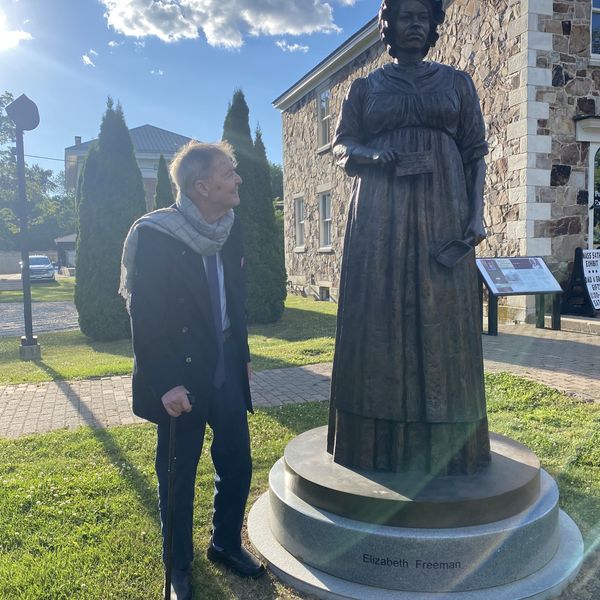Roman Pucinski, our Alderman on Chicago’s Northwest Side.
Danny Rostenkowski, our U.S. Congressman, who went to the slammer for various skullduggeries, who can recall them all?
Poles? And Slovaks, Croatians, Serbs, Russians, all speaking broken English. My sainted busha, my Slovak grandmother who outlived three husbands, I am sure she poisoned numbers two and three, she was a great cook and knew all about “spices” — Hungarian (her real love and the father of her five), Slovak and German.
The Hungarian. When Mary Kosach landed in New York, just before Ellis Island existed, she told the customs people she was here to find her husband. It seems they thought that he was here somewhere to be found. He was, but not in the way they thought. A while later Mary and Alex Lipsey met for the first time.
She had been saved, I later learned, from a life in a relative’s hotel-cum-brothel in Slovakia when her mother raised the cash to get her out and off to America.
The Slovak. He is remembered best by his entreaties to Mary to give him pienadze for pivo. She would relent and off he went to the gin mill.
The German. Holzmann. Woodman, who was in fact a baker. He was also an amateur chiropractor. Whenever we went over, he was sure to have my mother lie facedown down on the couch and give her a strenuous “Drick.” As my father looked on.
Where my mother learned to give my father strenuous Dricks for his ever-ailing back.
There were times when my father could not straighten up. We had to bustle him off in a cab to the chiropractor (nicht Holzmann, Gott sei dank).
Fast forward to the early ’70s when I found myself in Turtle Bay, Manhattan, hanging with Poles not at all like Roman Pucinski and Danny Rostenkowski. These Poles were the artists/intelligentsia newly arrived from Warszawa and Krakow and Wodz, home of the famous film school that produced Roman Polanski, disgraced child molester and brilliant filmmaker (what is it with these guys — Polanski, Woody Allen), Jerzy Skolomowski and Andrzej Wajda (pronounced Vida), director of one of the greatest post-War films, “Ashes and Diamonds.” It takes place on the last day of World War II in Poland. The Nazis have finally been defeated; the Russians are about to take over.
I used to teach the film and began with my Polish history lesson. I drew three circles on the board, from left to right. I said all you need to know is that the first circle is Germany, the middle is Poland, and the third is Russia. The first marauds over the middle, from West to East; then the third marauds over the middle, from East to West. Guess which country takes it in the groin every time. End of lesson.
One of the Turtle Bay painters said to me that he didn’t understand why, in Poland, they had heard of America’s Polish jokes making fun of his countrymen. He could not fathom it. What could they possibly be about? I could not explain.
Another time we were all sitting, drinking. (My hostess, Elzbieta, a great beauty, used to say that a Polish wedding party was never over until all the bottles were empty. Every Polish party was its own wedding.)
Once there was a very stern man at table who finally left. After a minute, there was an eruption of laughter. “Polish KGB,” all shouted.
Beata, another beauty (is there another Polish kind?), gave me a note, helping me in my fledgling Polski. It read: Ja jestem — I am.
Elzbieta took me to Jimmie’s Corner, a narrow dive on 44th between 6th and 7th in Manhattan. Why? It was owned by Jimmie, a Black former boxer and his beauteous Polish wife Eva. Boxing photos covered the walls, one with Jimmie and Harold Carter, a former middleweight champ and an elegant Black man. My father, a great fight fan named Harold Carter, was an elegant white man.
At a wedding, not Polish, of twin sisters named Carter, their mother told me that all Carters Black and white were related going back to a huge plantation in Virginia owned by one Rock Carter. As the legendary Casey Stengel used to say, long before Google, You can look it up.
Word had it that Jimmie’s hole-in-the-wall survived in this high rent district because the landlord loved the place. A rarity all around. Jimmie died recently, as did his beauteous wife Eva before him. I don’t know if the Corner, which was nowhere near a corner, will survive.
From Roman and Danny to Jimmie and Eva and Andrzej and Elzbieta and Beata — Wczorai Dziszai Jutro,
Ja Jestem.
Lonnie Carter is a writer who lives in Falls Village. Email him at lonniety@comcast.net, or go to his website at www.lonniecarter.com.















Circling around the Poles, from Roman to Elzbieta